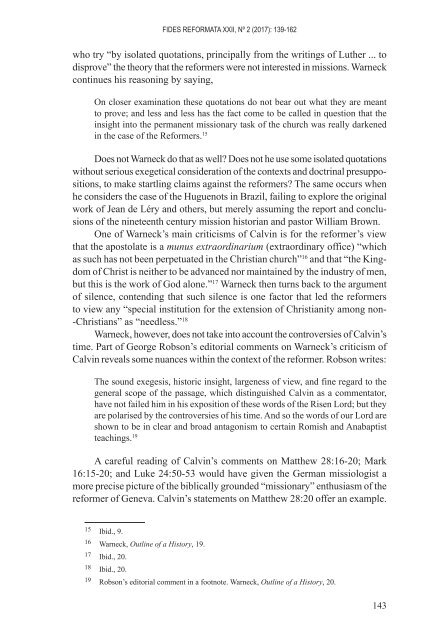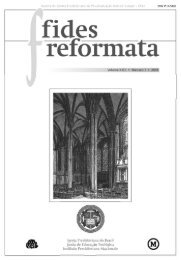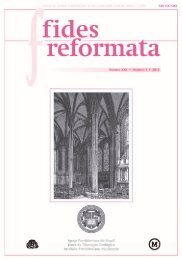Fides 22 N2
Um publicação do Centro Presbiteriano de Pós-graduação Andrew Jumper.
Um publicação do Centro Presbiteriano de Pós-graduação Andrew Jumper.
You also want an ePaper? Increase the reach of your titles
YUMPU automatically turns print PDFs into web optimized ePapers that Google loves.
FIDES REFORMATA XXII, Nº 2 (2017): 139-162<br />
who try “by isolated quotations, principally from the writings of Luther ... to<br />
disprove” the theory that the reformers were not interested in missions. Warneck<br />
continues his reasoning by saying,<br />
On closer examination these quotations do not bear out what they are meant<br />
to prove; and less and less has the fact come to be called in question that the<br />
insight into the permanent missionary task of the church was really darkened<br />
in the case of the Reformers. 15<br />
Does not Warneck do that as well? Does not he use some isolated quotations<br />
without serious exegetical consideration of the contexts and doctrinal presuppositions,<br />
to make startling claims against the reformers? The same occurs when<br />
he considers the case of the Huguenots in Brazil, failing to explore the original<br />
work of Jean de Léry and others, but merely assuming the report and conclusions<br />
of the nineteenth century mission historian and pastor William Brown.<br />
One of Warneck’s main criticisms of Calvin is for the reformer’s view<br />
that the apostolate is a munus extraordinarium (extraordinary office) “which<br />
as such has not been perpetuated in the Christian church” 16 and that “the Kingdom<br />
of Christ is neither to be advanced nor maintained by the industry of men,<br />
but this is the work of God alone.” 17 Warneck then turns back to the argument<br />
of silence, contending that such silence is one factor that led the reformers<br />
to view any “special institution for the extension of Christianity among non-<br />
-Christians” as “needless.” 18<br />
Warneck, however, does not take into account the controversies of Calvin’s<br />
time. Part of George Robson’s editorial comments on Warneck’s criticism of<br />
Calvin reveals some nuances within the context of the reformer. Robson writes:<br />
The sound exegesis, historic insight, largeness of view, and fine regard to the<br />
general scope of the passage, which distinguished Calvin as a commentator,<br />
have not failed him in his exposition of these words of the Risen Lord; but they<br />
are polarised by the controversies of his time. And so the words of our Lord are<br />
shown to be in clear and broad antagonism to certain Romish and Anabaptist<br />
teachings. 19<br />
A careful reading of Calvin’s comments on Matthew 28:16-20; Mark<br />
16:15-20; and Luke 24:50-53 would have given the German missiologist a<br />
more precise picture of the biblically grounded “missionary” enthusiasm of the<br />
reformer of Geneva. Calvin’s statements on Matthew 28:20 offer an example.<br />
15 Ibid., 9.<br />
16 Warneck, Outline of a History, 19.<br />
17 Ibid., 20.<br />
18 Ibid., 20.<br />
19 Robson’s editorial comment in a footnote. Warneck, Outline of a History, 20.<br />
143




